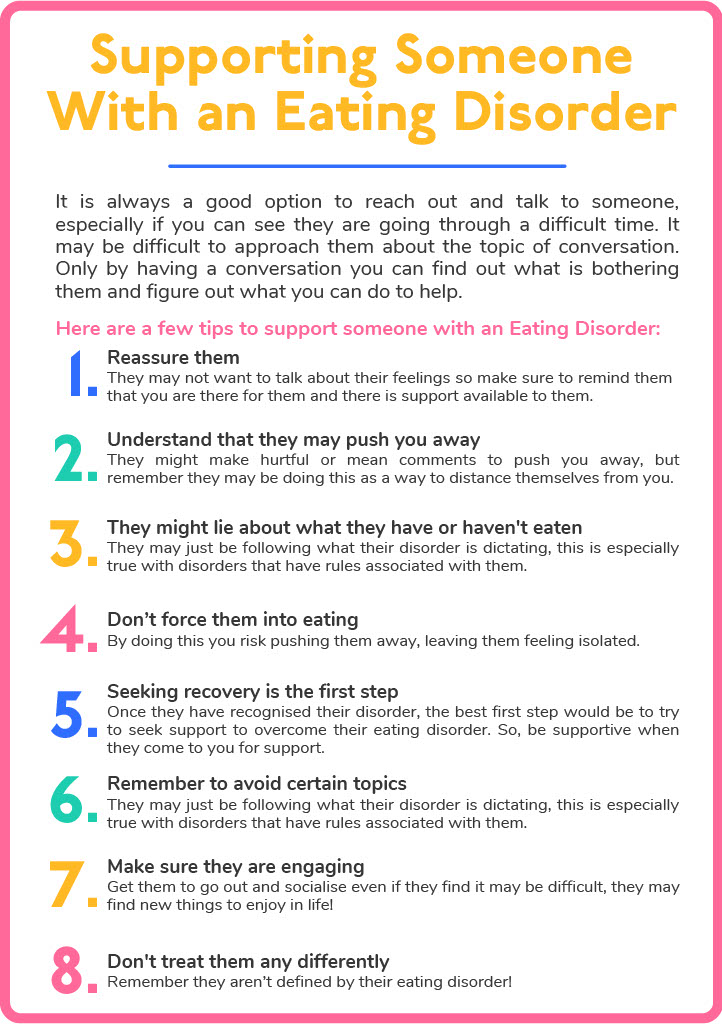If you believe you have an eating disorder or are worried about your body image and relationship with food, please seek professional help and support by contacting your GP, as they can refer you to a specialist.
What is an Eating Disorder?
Eating disorders are a broad, complex range of mental conditions that cause impairments in one’s physical and mental health due to long-term disturbances in their eating behaviours. They can affect anyone, and there is support in place if this affects you. Reaching out to your GP, using the helplines provided below and finding treatment is the best course of action.
Unhealthy eating behaviours may include:
-
Eating too much or too little
-
Only eating certain things
-
Worrying about your weight or the shape of your body
-
Getting rid of the food eaten by making themselves sick, using laxatives, fasting or through excessive exercise
-
It may also include a combination of all of the above
We understand that it may be difficult to reach out in the first instance but it is important that you do, if you are struggling with this it may be worth speaking to a family member or a friend first so they can support you.
The types of eating disorders?
As mentioned above, anyone can be diagnosed with an eating disorder. There are several types of eating disorders and sometimes it is possible for an individual to move between diagnoses especially if their symptoms change.
Anorexia Nervosa - Is a condition that develops out of anxiety around weight and body shape, it is often associated with the way they see themselves or how they are perceived by others.
Bulimia Nervosa - This is a condition that develops out of the desire to control body weight by controlling the way they eat, this comes in the form of severely restricting the amount of food eaten. People with Bulimia often binge eat and then compensate for this by vomiting, fasting, excessive exercising or taking laxatives. People with Bulimia are caught in a constant cycle of bingeing and purging.
Binge Eating Disorder (BED) - People with this Disorder tend to binge eat large quantities of foods over short periods of time, even if they aren’t hungry.
Other specified feeding or eating disorder (OSFED) - Is typically used as an umbrella term for numerous different symptoms, that can include other eating disorders. It is mainly used for symptoms that don’t fall under Anorexia, Bulimia or Binge eating disorder.
Avoidant/ restrictive food intake disorder (ARFID) - This is a condition where someone would avoid eating certain foods or types of foods, restricting their intake of food. This disorder can have a negative impact on a person's physical and psychological well-being as they aren’t getting the nutrients they need.
Support offered by BEAT:
Additionally, you can speak to a specialist advisor at BEAT, they offer free and confidential advice. Beat is the UK’s leading eating disorder charity, they support those affected by eating disorders. They are champions, guides and a friend to anyone who is suffering from an eating disorder.
You can find more information on their website by clicking here
Useful links
Safeguarding Policies
The Students' Union and The University have Safeguarding policies in place to protect everyone, this applies to all our students, staff, applicants, volunteers, visitors and anyone that represents the Union and University. The policy also applies to face-to-face activities and activities delivered online.
You can find out more information about both Safeguarding Policies by clicking on the links below:
Students' Union Safeguarding Policy
The University's Safeguarding Policy